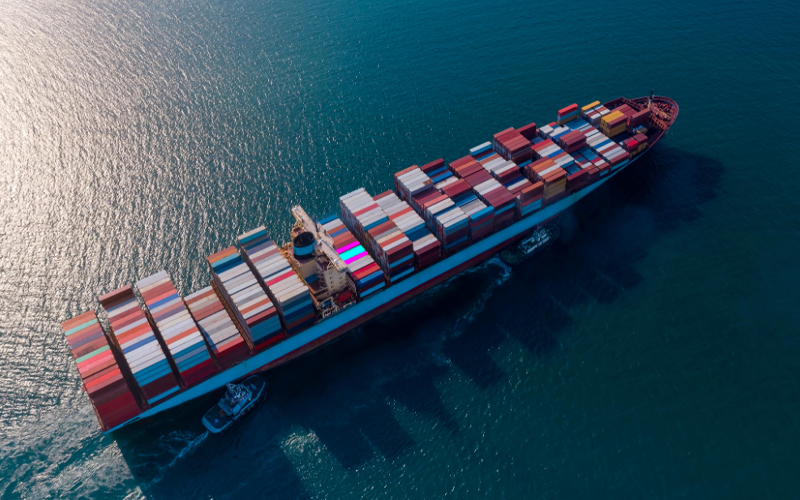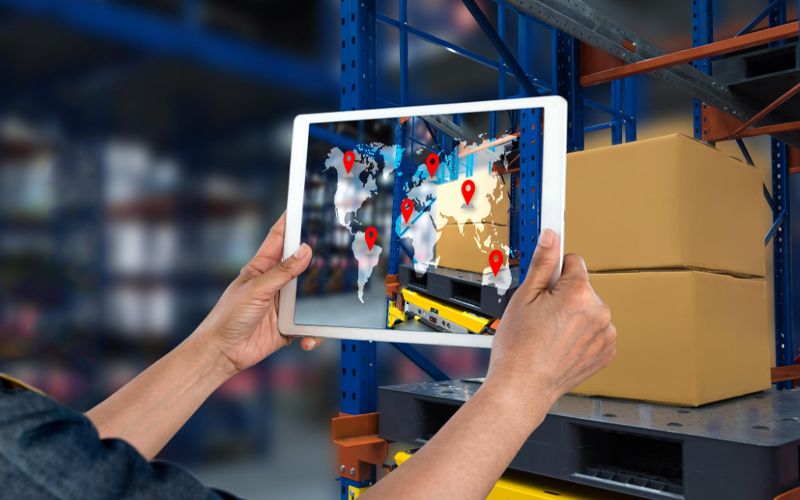Making industrial operations easier could be deemed as the motivation for innovation in all disciplines. This has, of course, led to some astonishing technological marvels. A mere science fiction just a decade ago, Artificial Intelligence (AI) has since come a long way, finding applications in virtually every industry. An argument may be made that humans are superior in tackling complex problems. But when it comes to simple, repetitive, and procedural tasks – as common in one of the most crucial aspects of industrial evolution, the logistics industry – AI has come a long way. Mimicking human intelligence, AI solutions have the potential to transform logistics processes.
AI in logistics refers to the application of artificial intelligence technologies such as machine learning, predictive analytics, and automation to improve planning, execution, and decision-making across logistics operations.
But what role can AI play in logistics?
What Is AI in Logistics?
AI in logistics involves the use of intelligent systems that can analyse large volumes of operational data, learn from patterns, and support real-time decision-making across transportation, warehousing, inventory, and fulfilment processes.
The application of artificial intelligence in logistics enables organisations to move from reactive operations to predictive and autonomous logistics management.
Why AI Is Transforming the Logistics Industry
Operational Complexity and Cost Pressures
Modern logistics networks are increasingly complex, spanning global suppliers, multiple transportation modes, and distributed warehouses. AI helps organisations manage this complexity by optimising routes, automating workflows, and reducing operational inefficiencies.
Demand Volatility and Rising Customer Expectations
With fluctuating demand patterns and rising expectations for faster and more reliable deliveries, AI enables logistics companies to anticipate changes, improve service levels, and respond proactively to disruptions.
Challenges in implementing AI solutions for logistics
Discussing artificial intelligence in logistics, the first thing that comes up is the challenges and limitations of implementing AI. Although many of these challenges stem from resistance to change, there are some valid concerns we must address.
Some of the most common challenges and limitations of AI for logistics are:
- Resistance to change
- Training data quality and access
- Integration with legacy systems
- High implementation costs
- Potential job losses to automation
- Data privacy and security compliance
Key Applications and AI Use Cases in Logistics
Despite the prevalent discussion on challenges, AI solutions have prevailed – especially with the help of logistics business process outsourcing solutions – as we can see many emerging trends and applications of AI in logistics. The logistics industry has been quick to adopt AI solutions, and as a result, they have become a requirement to stay competitive.
Here are some of the most common – and emerging – use cases of AI for logistics:
- Autonomous and Assisted Transportation
- Warehouse Automation and Intelligent Fulfilment
- Smart Infrastructure and Connected Roads
- AI-Driven Route Optimisation
- Demand Forecasting and Inventory Planning
- Intelligent Back-Office Operations
- Predictive Risk Management and Disruption Planning
Autonomous vehicles – or "smart vehicles" – can allow the logistics industry to automate goods transportation processes while saving time, reducing costs, and minimising accidents.
AI is already transforming warehouse operations, automating routine tasks, analysing inventory processes, connecting multiple warehouses for optimal transportation, and performing quality checks.
Although still a work in progress, many companies are building smart roads that can help road safety and reduce delays to make deliveries faster.
The logistics industry routinely relies on route optimisation to minimise transportation costs. AI in logistics can make this process easier – combining traffic, weather, location, and other data – to ensure faster delivery, lower fuel consumption.
With shifting demand patterns, demand prediction is critical for optimal inventory management. AI algorithms can identify and predict demand trends, allowing organisations to maintain optimal inventory levels.
AI plays a significant role in ensuring speed and accuracy of logistics back-office operations critical for performance efficiency.
The logistics industry is vulnerable to global geopolitical events and can collapse in the absence of effective risk management. AI risk management tools can help you model different scenarios and use predictive analytics to forecast potential outcomes to support business continuity planning.
Business Benefits of AI in Logistics
With such a wide range of applications, AI in logistics delivers measurable business benefits for enterprises. These include improved transparency and visibility across supply chains, enhanced cost-effectiveness and operational efficiency, optimised inventory and transport management, and improved customer experience and satisfaction.
*For organisations on the digital transformation journey, agility is key in responding to a rapidly changing technology and business landscape. Now more than ever, it is crucial to deliver and exceed organisational expectations with a robust digital mindset backed by innovation. Enabling businesses to sense, learn, respond, and evolve like living organisms will be imperative for business excellence. A comprehensive yet modular suite of services is doing precisely that - equipping organisations with intuitive decision-making automatically at scale, actionable insights based on real-time solutions, anytime/anywhere experience, and in-depth data visibility across functions leading to hyper-productivity, Live Enterprise is building connected organisations that are innovating collaboratively for the future.
How can Infosys BPM help?
Infosys BPM logistics business process outsourcing can help you navigate the unpredictable logistics industry to ensure a robust supply chain, optimal operational costs, and excellent customer experience. Leverage innovative technology and Infosys BPM logistics business process outsourcing services to integrate AI into your logistics operations and ensure delivery excellence.
FAQ
AI in logistics refers to the application of artificial intelligence technologies such as machine learning, predictive analytics, and automation to optimize transportation, warehousing, inventory management, and decision-making across logistics operations.
The most common AI use cases in logistics include route optimisation, warehouse automation, demand forecasting, predictive risk management, autonomous or assisted transportation, and intelligent back-office operations.
AI in logistics helps organizations improve supply chain visibility, reduce operational costs, enhance delivery speed and accuracy, optimize inventory levels, and improve overall customer experience while increasing resilience to disruptions.
Common challenges include data quality and accessibility issues, integration with legacy systems, resistance to change, high implementation costs, workforce transition concerns, and data privacy and security compliance requirements.
Outsourcing enables organizations to adopt AI in logistics more efficiently by providing access to domain expertise, scalable technology platforms, standardized processes, and managed services that reduce complexity and accelerate value realization.







